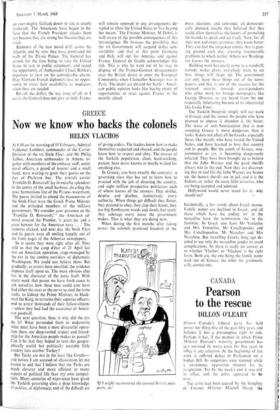Pearson to the rescue
CANADA DILLON O'LEARY
Ottawa—Canada's Liberal party has held power for thirty-five of the past fifty years and believes it has a presumptive right to rule. Perhaps it has, if the manner in which Prime Minister Pearson's minority government has just survived its worst crisis for five years in office is any criterion. At the beginning of last week it suffered defeat in Parliament on a budget Bill. Its supporters were stunned, while a unanimous opposition shouted for its resignation. Yet by the week's end it was still in office, and the crisis appeared to be over.
The crisis had been caused by the bungling of Finance Minister Mitchell Sharp, the government whip, in allowing the budget Bill to come to a division on third reading on a lackadaisical Monday night in a House of Commons sitting with ninety-five absentees. There had been no need for a vote at all, and the government front bench simply failed to notice the precarious balance of forces in the House. The opposition demanded a vote, and the Bill went down by eighty-four to eighty- two.
Sharp then said the Bill was vital—to com- bat inflation. Last year the cost of living rose 4.5 per cent, and in the last four years it has gone up 14 per cent. The Bill was de- signed to raise $290 million by accelerated pay- ments of corporation taxes, and another $185 million by a 5 per cent surcharge on personal income taxes. It was also part of the govern- ment's attempt to restore confidence in the Canadian dollar, which has been a bit wobbly since last December, reflecting the difficulties of the American dollar.
All four opposition parties naturally agreed that the defeat of the budget Bill was a vote of no confidence in the government. The offical Conservative opposition was most ada- mant, maintaining that the Commons could not meet for the government to present more business to it, and that the government must dissolve Parliament and go to the elector- ate.
For three days Parliament was almost on strike. The Conservatives refused to attend any committees, and their boycott brought most of them to a halt. The Conservative minority tried unsuccessfully to adjourn the Senate, As the Commons met each day, the government was forced to adjourn within a few minutes. Yet the debate raged on, for when Parliament halted, the two national tele- vision networks took over, and for a week Canada had parliament by television: poli- ticians of all parties debated their views at length before the cameras which blocked the corridors.
The defeat had brought Pearson hurrying back to Ottawa from a Jamaica vacation, for which he had left with nary a worry that his government was in danger. As he flew in, talk of a snap election was on a crescendo. Liberal hopes of re-election seemed nil. For in Decem- ber Pearson had announced his irrevocable decision to resign, and his refusal to lead the party in another election; his exit had been set for April, after a Liberal leadership con- vention to choose a new leader. A snap elec- tion would have left the Liberals virtually leaderless for the fray.
On television Pearson's strategy began to emerge. Within twenty-four hours of the upset, he was addressing the nation, saying he did not regard the vote as one of confidence. (It was on third reading, whereas second read- ing approves a Bill in principle, he said.) But to settle the issue, he would bring a confidence motion before the Commons, and if the gov- ernment were defeated on this, he would dis- solve Parliament.
He was fighting for time in which the opposition might crack. He knew his minority government could have been defeated often in the past two years if the opposition had truly wanted to upset it; but the Liberals could usually count on the support of one of the splinter parties or, if they were all united, on a few discreet absentees in the opposition during every division. So Pearson told his television audiences he could think of many things the country needed more than a general election—just to remind them of five wearying elections in the past eleven years.
The Conservatives unintentionally assisted Pearson's quest for time by refusing to grant him the necessary unanimous consent to in- troduce his confidence motion with less than forty-eight hours' notice. When the motion was finally printed on the order papers, it further infuriated Conservatives and New Democrats, for it was not a straight confidence motion, but asked the house to endorse the government's claim that the vote on the bud- get Bill had not been a vote of no confidence. This lent credence to rumours that the govern- ment planned to reintroduce the defeated Bill.
Nevertheless, the odds were slightly in favour of the motion being carried. The Liberals and the four-party opposition had a potential 129 votes each; but the three inde- pendents were behind the government. By Thursday, however, the opposition had cracked. Real Caouette, leader of the Creditistes (a Quebec wing of the Social Credit party), re- versed his stand and said his eight members would vote with the government. When the debate began on Friday and Caouette repeated his stand, the constitutional arguments and Orations became only gestures. Caouette had tipped the balance for a comfortable Liberal majority.
Pearson promised during the debate that his government would introduce totally new measures to resist inflation and balance the budget. Whether he can get such measures through Parliament remains to be seen—but his handling of the crisis, whatever one thinks of his constitutional arguments, has belied his reputation as a mere amateur politician. He fought with skill and tenacity for the Liberals' divine right to rule, and won. Whether his successor, to be chosen, presumably, from among the ministers who almost Iet the government crash through their carelessness, will succeed in upholding that divine right is another matter.



































 Previous page
Previous page